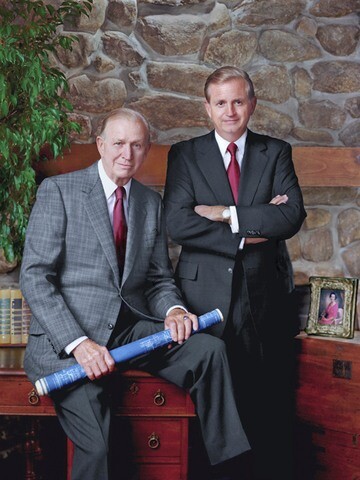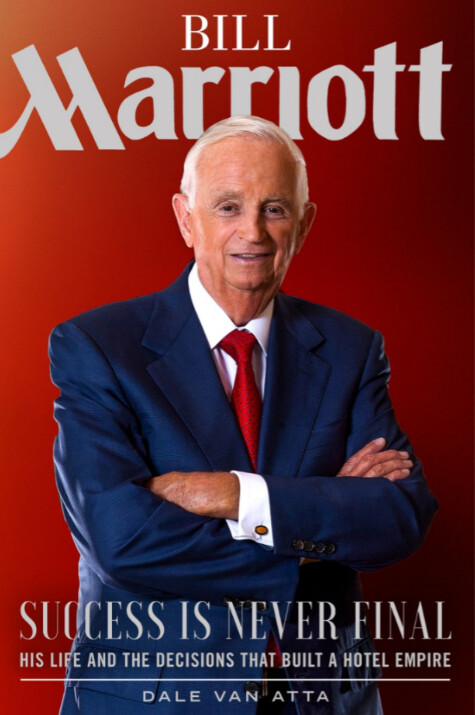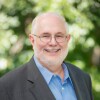When Church member and businessman Bill Marriott built a hotel in Philadelphia in the 1960s, it was Marriott’s first purely suburban hostelry. “It was not downtown,” he said. “It was not next to an airport, and it was not on a major highway. It was just a big suburban hotel.” Bill’s father, J.Willard (J.W.) Marriott, had bought the land for $30,000 in the 1940s. It was just outside the city’s limits in the upscale Bala Cynwyd neighborhood, a block from the heavily traveled Schuylkill Expressway and less than five miles west of the center of Philadelphia, which then had a population of four million and was the fourth-largest city in the country. When a contingent of Philadelphia businessmen had offered J.W. $1 million for the property, his response was, “Why?”
“We want to build a hotel there; it’s a better location than any you’ve got in Washington.” J.W. turned them down and years later gave Bill the go-ahead for the Philadelphia City Line hotel.
The board’s approval presented J.W. with a new wrinkle on an old problem—serving alcohol. The first three hotels had been built in Virginia and Texas, which were “dry” states. Pennsylvania, on the other hand, was a “wet” state that allowed the sale of alcohol in hotels except on Sundays. Bill commissioned a report from hotel consultants Horwath & Horwath, which concluded that the hotel would be successful in the early years primarily because of expected “extensive local use of the restaurant and bar facilities.” Bill knew they had to sell alcohol, and he advised his father accordingly.
J.W. still agonized over this decision in discussions with Bill, who had no similar misgivings. Bill advised J.W. to consult with Church leadership, as he had in the past. This time, he would talk with 87-year-old President David O. McKay.
“As you know, Brother Marriott,” President McKay told him, “the Word of Wisdom also enjoins abstinence from the use of tobacco, except as an herb for bruises and for sick cattle. Moreover, it enjoins abstinence from the consumption of hot drinks, such as tea or coffee.”
“Yes, President, I am aware of that.”
“Well, then, I will ask you as one brother to another, suppose a sheepman, like you were, goes into a grocery store owned by a Mormon to buy supplies, and he wants cigarettes for his men. If the storekeeper says—‘Sorry, we don’t carry tobacco in any form because it’s against our religion’—why, the customer won’t come back the next time. If he wants coffee for his men and the storekeeper says—‘We disapprove of it, and we don’t want your men to drink it either’—he won’t come back again. He’ll go to the store down the street not only for his tobacco and coffee, but for everything else he needs. In the long run, this could put the storekeeper out of business, don’t you agree?”
“Yes, President, it could—very easily,” J.W. responded.
“As I see it, Brother Marriott, if you don’t satisfy your customers’ wants and needs, you could be running the same risk. If liquor today is an essential part of the service that the hotel and restaurant industry offers to its patrons, it seems to me that you’re obliged to sell it to them. To sell it to them doesn’t mean that we approve of drinking any more than to sell a gun means approval of using that gun to commit a crime.
"The patron who believes as we do is not compelled to buy liquor, nor, indeed, is anyone. But it is the patron’s life, his money, his right to decide for himself, not ours.”
President McKay cautioned J.W. against liquor sales in any family-oriented Hot Shoppes, and concluded, “It is hard sometimes to find the right path in these confusing times. But I know you will find it, and I know you will follow it.”
When J.W. returned to Washington, Bill saw a changed man, at least in regard to this troublesome question. It was clear that his father felt unburdened by his talk with President McKay. Liquor was made available for patrons of the sophisticated specialty hotel restaurants and lounges, but never in the Hot Shoppes or in other company eateries where youngsters went.
Bill, himself, was deeply grateful for President McKay’s pragmatic counsel. Even though he had made the same points, his father accepted the advice more fully when it came from his Church leader. Because of J.W.’s frequent recounting of that meeting, it provided pivotal guidance for Bill in his own business dealings long after his father was gone.
Bill Marriott: Success Is Never Final - His Life and the Decisions That Built a Hotel Empire
Bill Marriott: Success Is Never Final gives readers an intimate portrait of the life of this business titan and his definition of success. Bill shares details about his private struggles with his father's chronic harsh criticism; his innovations in the hotel industry; and the boundless passion and energy he demonstrated for his work, family, and faith. Bill also shares spiritual experiences that allowed him to recognize God's guidance in his personal life.
This fascinating biography tells the story from Bill Marriott's first job in his family's restaurants to his monumental decisions in building a hotel empire. It is the remarkable story of a man who had the vision to create a multi-billion-dollar business, who understands the power of giving through substantial philanthropic work, and who lives the creed that hard work will pay off but success is never final. Available at Deseret Book and deseretbook.com.



